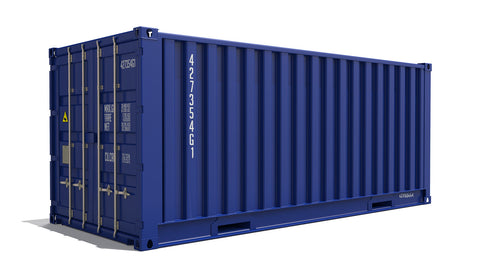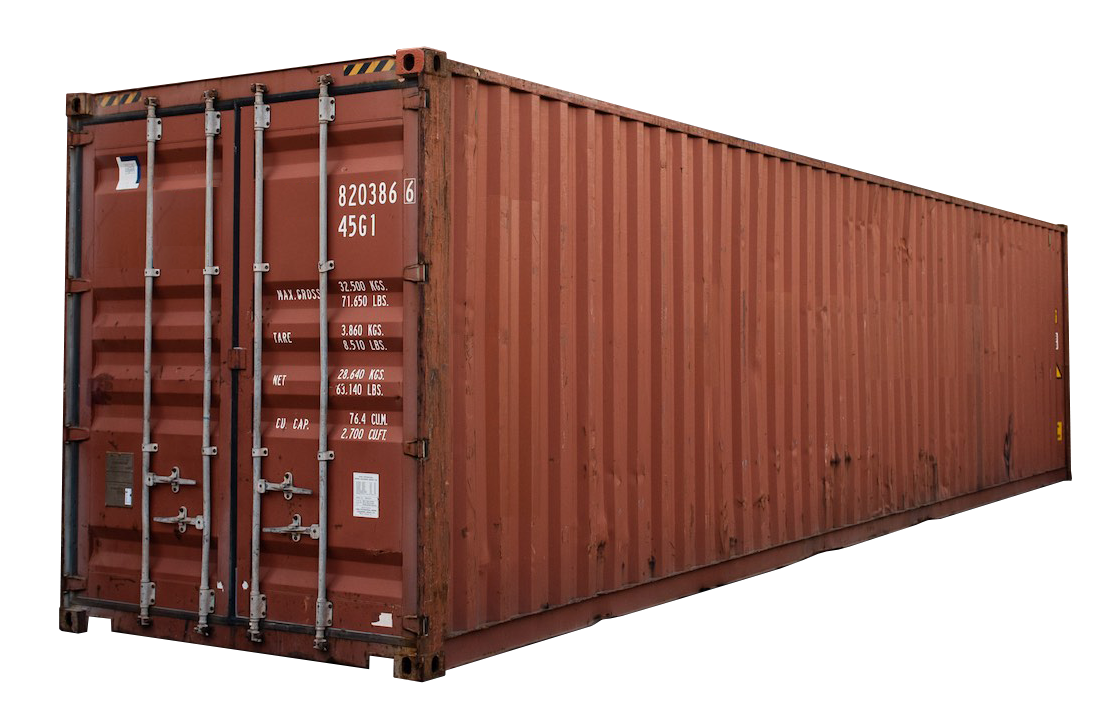Whatever You Need to Understand About Shipping Containers and Their Practical Applications
Shipping containers have progressed from simple tools for transportation to versatile structures with numerous practical applications. Their durable style and basic sizing make them optimal for a series of usages beyond shipping. From ingenious housing services to lasting farming, their flexibility is notable. The opportunities do not end there. Exploring their numerous functions exposes shocking understandings into contemporary obstacles and imaginative options. What other duties could these containers play in today's world?
The Design and Structure of Shipping Containers

Inside, containers are created to optimize space, frequently including wood or steel floor covering that can support considerable weight. Air flow systems might be integrated to avoid moisture buildup, which is essential for sensitive cargo. Furthermore, strengthened edges enable very easy handling by forklifts and cranes, promoting smooth loading and discharging. This thoughtful layout and framework add to the containers' versatility throughout various shipping and storage space applications.
Advantages of Making Use Of Shipping Containers
While lots of transportation methods have their advantages, making use of delivery containers stands apart because of their unrivaled flexibility and efficiency. Shipping containers use a standardized dimension, making them very easy to stack and move across different modes of transportation, including trucks, trains, and ships. This standardization reduces filling and discharging times, consequently increasing overall productivity.
Furthermore, shipping containers are created from sturdy materials, providing robust protection for products during transportation. They are secure and weather-resistant, lessening the risk of damages from environmental factors or theft. Furthermore, the modular style of shipping containers enables very easy modification, allowing businesses to adjust them for various purposes, such as storage or mobile workplaces.
Their portability and cost-effectiveness make shipping containers an eye-catching choice for services looking to simplify logistics and supply chain procedures. These benefits add to the growing appeal of delivery containers in numerous sectors.
Imaginative Real Estate Solutions With Shipping Containers
Innovative housing remedies have become an interesting application of delivery containers, leveraging their integral strengths for domestic usage. These flexible frameworks use a sustainable choice to standard building materials, often at a fraction of the price. Developers and architects have actually transformed containers into stylish, practical homes, dealing with varied way of livings and choices.

Shipping containers are environmentally friendly, advertising recycling and decreasing waste. Lots of tasks focus on energy effectiveness, including photovoltaic panels and eco-friendly roofs. As urbanization boosts, these innovative real estate solutions offer a sensible feedback to housing lacks while cultivating an unique building visual.
Shipping Containers in Retail and Pop-Up Shops
An expanding variety of sellers are turning to shipping containers as a vibrant option for pop-up stores and retail rooms. These versatile structures provide a cost-effective alternative to standard stores, permitting organizations to develop unique, attractive settings that attract consumers. Their modular layout allows very easy transportation and installation, making them excellent for seasonal or temporary retail areas.
Merchants can personalize shipping containers to reflect their brand name identification, transforming them into visually appealing stores that stand apart in jampacked marketplaces. The compact nature of containers also urges efficient usage of area, permitting innovative designs that optimize consumer circulation and interaction. Shipping containers can be situated in unusual areas, such as urban parks or uninhabited great deals, increasing ease of access and foot traffic.

As the retail landscape evolves, delivering containers provide a innovative and versatile option that fulfills the demands of modern-day customers Continue while enhancing the buying experience.
Sustainable Farming Practices Using Shipping Containers
Lasting farming techniques increasingly incorporate shipping containers as innovative options for agriculture - sea can for sale. These container ranches make use of hydroponics to maximize space and resource efficiency, using a cost-efficient strategy to food manufacturing. By changing delivery containers right into farming hubs, farmers can resolve food protection and ecological concerns simultaneously
Container Farming Perks
While typical agriculture faces obstacles such as land deficiency and climate modification, container farming presents a practical alternative that makes best use of area and resources. This cutting-edge method enables year-round plant production in regulated atmospheres, decreasing reliance on climate condition. Container ranches make use of much less water than standard farming, promoting sustainability and conservation. They can be developed in city areas, bringing fresh produce closer to customers and lowering transportation exhausts. Additionally, the modular nature of shipping containers allows scalability, enabling farmers to change operations based upon demand. Container farming additionally reduces chemical usage by developing an enclosed ecosystem, eventually boosting food safety. As city populations grow, container farming becomes a sensible solution to satisfy the boosting need for regional, lasting food resources.
Hydroponics in Containers
Hydroponics, which enables plants to grow without dirt by making use of nutrient-rich water, prospers within the boundaries of delivery containers, making it an ideal technique for metropolitan agriculture. These containers produce a controlled environment that optimizes humidity, light, and temperature, making it possible for year-round farming. With minimal space in urban areas, shipping containers offer a scalable option for growing fresh fruit and vegetables. Hydroponic systems within containers can consist of various methods, such as nutrient movie strategy (NFT) and deep water culture (DWC), which take full advantage of return while reducing water use. This ingenious approach not only improves food protection yet also reduces the carbon footprint connected with standard farming techniques. Consequently, hydroponics in containers stands for a forward-thinking option for lasting urban food production.
Economical Farming Solutions
As food manufacturing faces boosting challenges due to climate change and urbanization, shipping containers become a cost-effective option for agriculture. These functional structures can be repurposed for different sustainable farming practices, such as hydroponics and upright farming. By using regulated settings within containers, farmers can maximize growth cycles and minimize source intake, consisting of water and plant foods. In addition, shipping containers can be strategically positioned in metropolitan locations, decreasing transport prices and improving accessibility to fresh fruit and vegetables. Their modular nature enables scalability, making it possible for farmers to increase operations as demand grows. Moreover, repurposing containers adds to waste decrease, aligning with environment-friendly farming efforts. Overall, delivering containers existing cutting-edge opportunities for sustainable and reliable food manufacturing.
Emergency and Catastrophe Alleviation Applications of Shipping Containers

Organizations regularly make use of shipping containers to develop mobile facilities or field health centers, making sure that treatment gets to those in demand. Additionally, they can be changed right into command facilities for collaborating rescue operations, therefore boosting organizational effectiveness during situations.
Additionally, containers can be changed to keep necessary Clicking Here items such as food, water, and clothing, securing materials till they are dispersed. Their wheelchair enables them to be quickly transferred to various areas, guaranteeing that aid gets here where it is most quickly needed. In general, shipping containers play an essential role in improving the efficiency of catastrophe relief initiatives worldwide.
Often Asked Inquiries
Just How Are Shipping Containers Transported From One Place to An Additional?
Shipping containers are transferred through ships, vehicles, and trains, making use of cranes for loading and discharging. This multi-modal transport system makes certain efficient motion across land and sea, attaching global supply chains and assisting in worldwide profession.
What Is the Typical Life Expectancy of a Delivery Container?
The ordinary life expectancy of a delivery container commonly varies from 10 to 25 years, depending upon maintenance, use, and environmental aspects. Correct care can extend their use, while forget might cause damage and damages.
Can Shipping Containers Be Modified for Various Uses?
Yes, delivering containers can be changed for numerous usages. They function as homes, workplaces, pop-up stores, and storage space units. Their versatility permits imaginative adjustments, making them suitable for a wide variety of applications.
Are Shipping Containers Environmentally Friendly?
Shipping containers can be eco-friendly, as they promote reusing and repurposing. Their resilience lowers waste, while their usage you can look here in alternative real estate and businesses reduces the requirement for new products, adding to lasting practices.
How Do I Select the Right Size Shipping Container?
To choose the ideal size shipping container, one have to analyze storage needs, take into consideration the intended use, and examine space schedule - sea can for sale. Usual sizes include 20-foot and 40-foot containers, each serving various storage and transport requirements properly
Innovative housing solutions have actually arised as an exciting application of delivery containers, leveraging their fundamental toughness for domestic usage. The versatility of delivery containers enables for imaginative formats, from single-unit houses to complex multi-container setups. Lasting farming techniques progressively include delivery containers as innovative solutions for agriculture. Additionally, the modular nature of shipping containers makes it possible for scalability, enabling farmers to change procedures based on demand. Hydroponics, which permits plants to grow without soil by making use of nutrient-rich water, flourishes within the boundaries of shipping containers, making it a suitable method for urban farming.